#factchecking
Text
So the right-wing press is currently in meltdown about Queen being cancelled, they're cancelling Queen you guys. Those woke Millennials and Gen Z made them remove "Fat Bottomed Girls" from their Greatest Hits album.
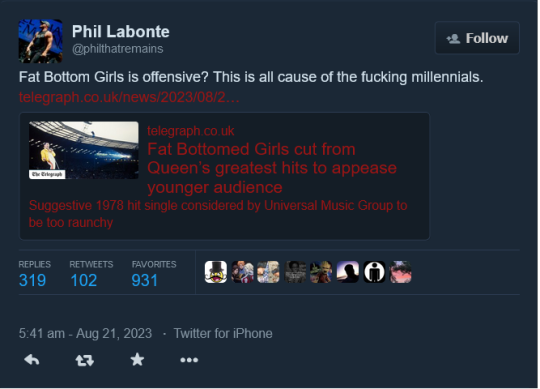
So is this true? Erm, no. What blog do you think this is.
There's a bit of deception in the headline here, which is of course all most people read. "Fat Bottomed Girls cut from Queen's greatest hits to appease younger audience". But if you go on Spotify right now, you'll find several versions of it, still uncancelled and listenable. So what gives?
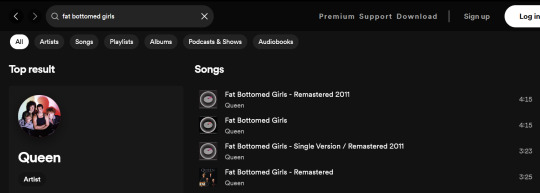
Well, by "to appease younger audience" they don't mean Millennials or Gen Z. They mean much younger. See, the song was only removed...on a platform for literal children.

Specifically, children 3-12. We're not talking about Millennials (whose youngest members are in their twenties, by the way) being sensitive here, we're talking about eight year olds. Now, whether "Fat Bottomed Girls" is inappropriate for children or not is a discussion you can have, but it's a discussion no one is having, because they're reading a misleading headline designed as right-wing outrage bait, and talking about it as if the song has been banned for everyone, and not been left off one niche music service for grade schoolers. What a sweet life these people lead, you don't have to read anything when you can just get mad over a headline and decide it's the result of whichever group you hate the most
Anyway you can still listen to any Queen song you like, provided you aren't getting your music from one specific website for children
937 notes
·
View notes
Text

ok yes but sometimes i need to see some bullshit
12 notes
·
View notes
Text
Life-is-more-boring-than-I’d-like PSA: the “I will donate your sandals to the temple of the moon god” post that has been going around again is an April Fools’ post from a couple of years ago, on the original website that was very obvious but the screenshots on Tumblr have cropped that out. Sometimes historical things that seem too relatable are, in fact, too relatable.
61 notes
·
View notes
Text
The Impact of Fake News on Crowdsourced Information
#MDA20009 #week8
Introduction
In today's digital age, the proliferation of fake news has become a concerning issue. This deceptive information can have a profound impact on crowdsourced data and the communities that rely on it. This blog explores the implications of fake news on crowdsourced information, shedding light on the challenges it poses and offering real-world examples (Dhiman 2023).

Crowdsourcing: The Backbone of Information
Crowdsourcing involves harnessing the collective knowledge and contributions of the public to gather, curate, and share information. It's a powerful tool for everything from Wikipedia to open-source projects. Crowdsourced data has revolutionized the way we access information and has become a valuable resource in a variety of fields. The power of crowdsourcing lies in its ability to tap into the collective wisdom of diverse individuals, leading to richer, more comprehensive information (Hargrave 2022).

The Rise of Fake News
The internet has given fake news an unprecedented platform to spread. False or misleading information, often disguised as legitimate news, can quickly go viral, causing confusion and distrust among online communities. Fake news can take various forms, from fabricated stories to manipulated images and misleading headlines. The ease of sharing information online, coupled with the increasing polarization of digital communities, has made fake news a persistent problem (Aimeur, Amri & Brassard 2023).

Impact on Crowdsourced Information
Challenge in Verification
One of the most significant challenges posed by fake news is the difficulty in verifying the accuracy of information on crowdsourced platforms. When fake news infiltrates these platforms, it becomes challenging to separate fact from fiction. Take, for example, a crowdsourced map of disaster areas. If it contains information derived from fake news reports, it could lead to misallocation of resources and even put lives at risk (Ludvik 2020).
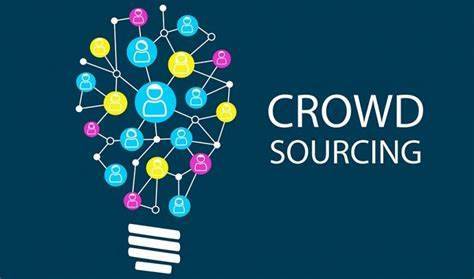
Disrupt and Polarization
Fake news doesn't just cloud the accuracy of crowdsourced data; it also erodes trust within communities. When information becomes tainted by false narratives, it can lead to division and polarization among users. For instance, a heated discussion on a platform like Reddit or Stack Exchange can escalate when fake news is introduced, undermining the collaborative nature of these platforms (Dizikes 2021).

Real-World Examples
Wikipedia Editing Wars
Wikipedia is a prime example of crowdsourced information. It relies on the contributions of volunteers to maintain an extensive and continuously evolving encyclopaedia. Fake news can disrupt this delicate balance, leading to what are known as "editing wars." These wars occur when contributors with conflicting beliefs and biases edit articles on controversial topics to reflect their viewpoints. For instance, articles on climate change have been battlegrounds for editing wars due to the influence of fake news and misinformation (Haviland 2018).

OpenStreetMap and Misplaced Crowdsourced Data
OpenStreetMap, a collaborative project to create a free and open map of the world, relies on contributors to provide accurate geographic data. Fake news can mislead contributors into adding inaccurate or misleading information. In one instance, fake news regarding the location of a prominent landmark led contributors to place it in the wrong place on the map, causing confusion for users and travellers (Novack, Vorbeck & Zipf 2021).
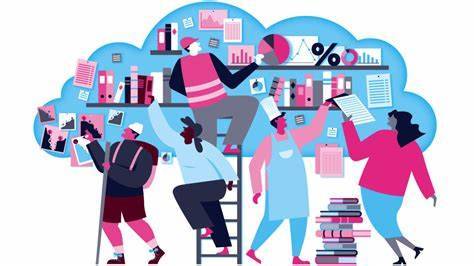
Combining the Impact
Media Literacy
Educating individuals about media literacy is crucial in combating the effects of fake news on crowdsourced data. Encouraging critical thinking and teaching individuals how to fact-check information can help users distinguish between credible and false information. Promoting media literacy not only empowers individuals to discern the accuracy of information but also contributes to a more informed and discerning online community (Lord & Vogt 2021).

Platform Policies
Crowdsourced platforms can play a vital role in mitigating the impact of fake news. They can implement stricter content policies and fact-checking measures to prevent the spread of false information within their communities. By setting clear guidelines and enforcing them rigorously, these platforms can help maintain the quality and credibility of crowdsourced information (Ng, Tang & Lee 2022).

User Vigilance
Empowering users to report suspicious content can be an effective means of maintaining the quality of crowdsourced information. Many platforms rely on vigilant users to help identify and address fake news. By encouraging users to flag misleading or false content, platforms can more effectively address the problem and maintain the trust of their communities (Zewe 2022).

Collaborative Fact-Checking
Promoting a culture of fact-checking among contributors can be a proactive approach to mitigate the impact of fake news on crowdsourced data. Crowdsourced platforms can encourage users to verify information before contributing it. This can help prevent the spread of false information, improve the accuracy of data, and enhance the overall quality of the shared knowledge (LI & Chang 2023).
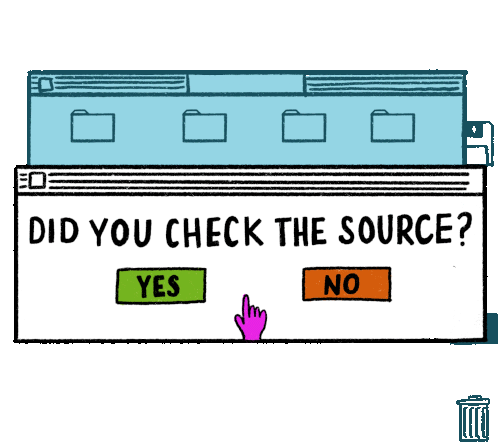
Conclusion
In an era filled with fake news, the effects on crowdsourced information are significant and complex. The examples provided highlight the challenges that communities face when trying to maintain the accuracy and integrity of their shared knowledge. However, by fostering media literacy, enforcing platform policies, promoting user vigilance, and encouraging collaborative fact-checking, we can collectively combat the negative impact of fake news and ensure that crowdsourced information remains a reliable resource in the digital age. Crowdsourcing has the potential to be a powerful force for good, and by addressing the challenges posed by fake news, we can harness its full potential in building a more informed and connected world.
List of References
Aimeur, E, Amri, S & Brassard, G 2023, 'Fake news, disinformation and misinformation in social media: a review', Soc Netw Anal Min, vol. 13, no. 1, viewed 1 November 2023, <https://www.ncbi.nlm.nih.gov/pmc/articles/PMC9910783/>.
Dhiman, B 2023,, 'The rise and impact of misinformation and fake news on digital youth: A critical review', University of Science and Technology, YMCA, 1 May, viewed 1 November 2023, <https://papers.ssrn.com/sol3/papers.cfm?abstract_id=4438362>.
Dizikes, P 2021, 'Study: Crowds can wise up to fake news', MIT News, 1 September, viewed 1 November 2023, <https://news.mit.edu/2021/crowd-source-fact-checking-0901>.
Hargrave, M 2022, Crowdsourcing: Definition, how it works, types, and examples, Investopedia, viewed 1 November 2023, <https://www.investopedia.com/terms/c/crowdsourcing.asp#:~:text=Crowdsourcing%20is%20the%20collection%20of%20information%2C%20opinions%2C%20or,skills%20or%20thoughts%20from%20all%20over%20the%20world.>.
Havilland, E 2018, 'Competing with or against crowds', Digital Innovation and Transformation, 19 March, viewed 1 November 2023, <https://d3.harvard.edu/platform-digit/submission/wikipedia-the-ultimate-crowdsourced-knowledge-tool/>.
Li, J & Chang, X 2023, 'Combatting misinformation by sharing the truth: a study on the spread of fact checks on social media', Information Systems Frontiers, 11 June, viewed 1 November 2023, <https://link.springer.com/article/10.1007/s10796-022-10296-z>.
Lord, KM & Vogt, K 2021, 'Strengthen media literacy to win the fight against misinformation', Stanford Social Innovation Review, 18 March, viewed 1 November 2023, <https://ssir.org/articles/entry/strengthen_media_literacy_to_win_the_fight_against_misinformation#>.
Ludvik, E 2020, The impact and role of crowdsourcing in the information age, Crowdsourcing Week, viewed 1 November 2023, <https://crowdsourcingweek.com/blog/the-impact-and-roles-of-crowdsourcing-in-the-information-age/>.
Ng, KC, Tang, J & Lee, D 2022, 'The effect of platform intervention policies on fake news discrimination and survival on empirical examination', Journal of Management Information Systems, vol. 38, no. 4, viewed 1 November 2023, <https://www.tandfonline.com/doi/full/10.1080/07421222.2021.1990612>.
Novack, T, Vorbeck, L & Zipf, A 2021, 'An investigation of the temporality of OpenStreetMap data contribution activities', Geo-spatial Information Science, 7 October, viewed 1 November 2023, <https://www.tandfonline.com/doi/full/10.1080/10095020.2022.2124127>.
Zewe, A 2022, 'Empowering social media users to assess content helps fight misinformation', Massachusetts Institute of Technology, 16 November, viewed 1 November 2023, <https://www.sciencedaily.com/releases/2022/11/221116150648.htm>.
2 notes
·
View notes
Text
How can we leverage the power of natural language processing and artificial intelligence to automate fact-checking and make it more efficient and scalable? In this latest blog article, we describe FactLLaMA, a new model that can optimize instruction-following language models with external knowledge for automated fact-checking. We explain what FactLLaMA is and more insightful information about this model.
#FactLLaMA#FactChecking#NLP#AI#MachineLearning#LanguageModels#Knowledge#AIModel#open source#artificial intelligence#machine learning#data science#datascience
2 notes
·
View notes
Text
"l'extrême droite ment"... Alors laissons lui le monopole du mensonge !
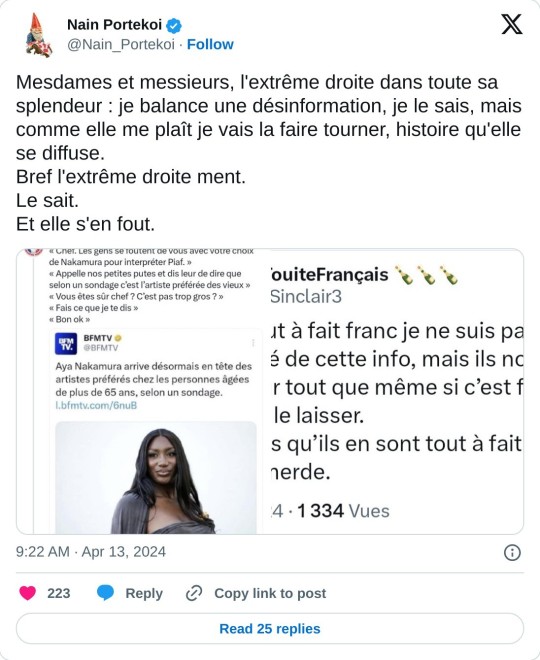
Petit exemple de mensonge décomplexé.
C'est le post d'un honorable twittos qui a attiré mon attention là-dessus :
Pour être tout à fait franc je ne suis pas certain de la véracité de cette info, mais ils nous mentent tellement sur tout que même si c’est fake, ça m’amuse de le laisser. D’autant plus qu’ils en sont tout à fait capables. Et je les emmerde.


Donc, on a une fausse capture écran d'un tweet que BFMTV n'a jamais publié. Et on a un gros compte d'extrême-droite, avec presque 95'000 abonnés, qui reprend cette fausse capture écran, en la commentant, comme si c'était vrai.
Et qui rajoute derrière un truc du genre "c'est peut-être pas vrai, mais je m'en fous, ça pourrait l'être".
Remarquez le procédé qui consiste ici à fabriquer une info mensongère que l'on attribue à d'autres, ici les médias, pour ensuite les accuser de mentir...
...Et pour justifier, à demi-mot son propre mensonge, il rajoute ensuite :"Ils nous mentent tellement"...

Et l'honorable twittos qui voit passer ce bullshit résume la chose fort justement :
Je balance une désinformation, je le sais, mais comme elle me plaît je vais la faire tourner, histoire qu'elle se diffuse.
Bref l'extrême droite ment.

Oui.
L'extrême droite ment.
Mais...
...j'ai une proposition.
Et si on décidait de laisser le monopole du mensonge à l'extrême-droite ?
Parce que toutes ces stratégies utilisées par l'extrême droite pour mentir de manière décomplexée, on connaît.
Mais est-ce qu'il n'y a que l'extrême-droite qui joue au sale petit jeu du "'c'est peut-être faux mais c'est pas grave" ?
Non.
Des formules tout aussi connes que le coup du "alternative facts" de Kellyane Conway, j'en vois passer plein chez des gens qui prétendent défendre de belles et nobles causes.
Et je me dis que dans le débat public aujourd'hui, si vraiment quelqu'un se sent obligé de mentir pour défendre sa position, c'est peut-être que sa position ne mérite pas d'être défendue...
Je suis un militant.
À ma manière.
Je participe à un combat politique.
Je milite pour que, dans le débat public, chacun se soucie de véracité.
Pour que nous ne sombrions pas dans une société de post-vérité généralisée.
Pour que les belles et nobles causes à défendre ne soient pas souillées par des mensonges et du bullshit.
Pour que l'opposition entre vérité et mensonge ne devienne pas un enjeu secondaire, une sorte de luxe encombrant, dont on n'aurait pas trop à se soucier du moment que l'on serait soi-même dans le "bon camp".
D'ailleurs, si vous tolérez le mensonge, du moment qu'il vienne du "bon camp", qu'il soit au service de "nobles causes", et peu importe les dénominations et les excuses que vous collerez sur ce mensonge...
...Quelle place laissez-vous à la remise en cause, au questionnement ?
Face à des faits qui pourraient amener une remise en cause, un questionnement, n'allez-vous pas être tentés de simplement inventer des "faits alternatifs" pour occulter le problème ?
...
Laissons donc le mensonge et le bullshit à l'extrême-droite, à celles et ceux qui défendent l'indéfendable.




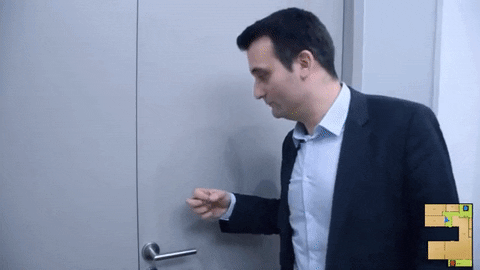
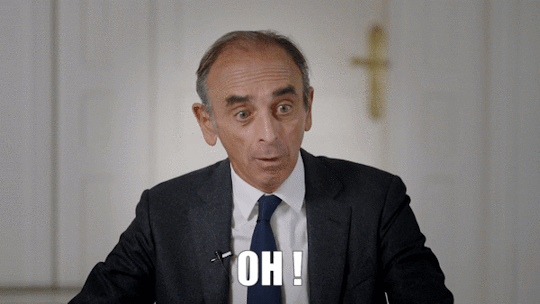
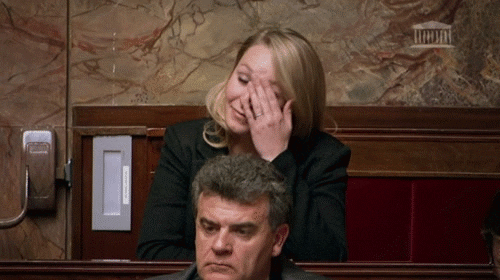





0 notes
Link
Artificial Intelligence in Journalism
0 notes
Text
Over on Twitter, "community notes" are "factchecking" claims that drag queens and trans women were at Stonewall by invoking the words of one Fred Sargeant, a Stonewall veteran turned cop turned TERF - not using that as a generic descriptor, but an accurate one, as his bio has "I Stand With JK" in it.
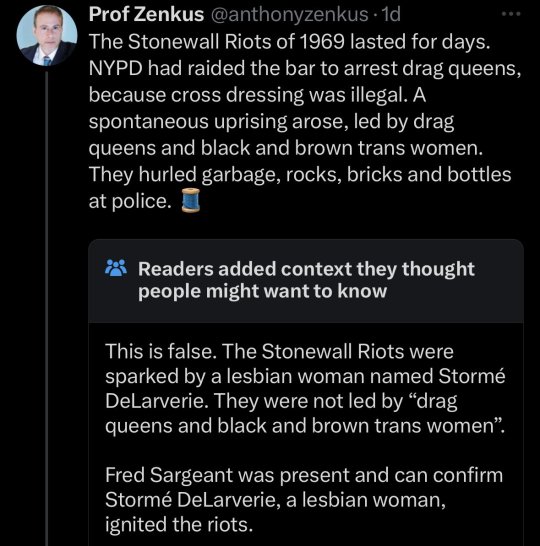
Fred Sargeant has, in recent years, pivoted hard to erasure of trans people and drag queens from the history of Stonewall, in the name of proving that it was entirely cis lesbians and cis gay men responsible, and when anyone pushes back, he drops the phrase that in his view terminates all debate: he was there and you were not, so you've got to trust him.
One problem, though. By his own admission, Fred Sargeant was not in the Stonewall Inn that night, and only came upon the event after police entered the bar.
Yes, his story has always been that he was at a dinner party when it began, and observed Stonewall when he walked by and saw people and cops gathered outside the bar. As he said at the time:
The kids felt that some of the other kids were being kept inside and being beaten up by the police. I don't know whether it really happened that way or not, but the rumor spread.
Authoritative stuff.
Sources do agree Stormé DeLarverie, alone or part of a group of butch lesbians, scuffled with police; they disagree on if that was the singular cause of it escalating into a riot or one of several causes. Stonewall is...a incredibly fuzzy event we'll never have a perfectly objective record of, for many, many reasons, and we accepted that, until a guy who was at a dinner party instead of in the bar decided to appoint himself the One Authoritative Voice on what really happened at Stonewall that night, and frame anyone who disagrees with him as a liar who just can't accept the truth.
Stonewall probably wasn't exclusively about trans people, but it sure as hell wasn't not at all about trans people either.
...again, this guy lived through Stonewall and then became a cop, and he wants himself to be the sole acceptable elder for the entire gay community.
310 notes
·
View notes
Text
Misinformation...a Shaman's Opinion
The issue of misinformation can benefit from a comprehensive analysis: #1. What factors contributed to the propagation of misinformation? #2. Is there a potential for misinformation to resurface? The crux of the problem lies not solely in misinformation i
As part of my professional qualifications, I hold active memberships in several esteemed psychology organizations. In recent times, I have been in frequent communication with academic sources concerning the initiation and review of studies and programs aimed at safeguarding the public from falling prey to hazardous conspiracy theories. From a psychological standpoint, it is imperative that all…
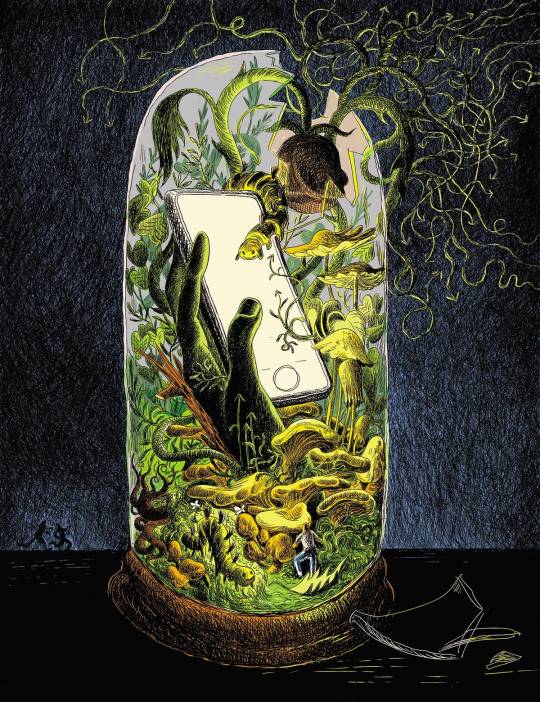
View On WordPress
#CognitiveBias#CombatingConspiracy#CommunityEngagement#CriticalThinking#CulturalNarratives#EmotionalResonance#EvidenceBased#FactChecking#InformationTrust#MisinformationAwareness#NarrativeChange#NarrativePsychology#PsychologicalResilience#PsychologyOfMisinformation#PublicEducation#ScienceCommunication#ScientificLiteracy#ShamanicWisdom#SocialMediaLiteracy
0 notes
Text
BBC Verify
Introduction: Accusations of fake news have become prevalent in today's media landscape, with even well-established organizations facing scrutiny. Recently, some voices have accused BBC Verify of being a peddler of misinformation. In this post, we will delve into the allegations and explore the credibility of such claims.
Background on BBC Verify:
BBC Verify is a platform designed to fact-check information and counter the spread of misinformation. As part of the BBC, it is held to high journalistic standards and aims to provide accurate and unbiased information to the public. However, like any organisation, it is not immune to criticism.

Claims of Fake News:
Critics argue that BBC Verify has, at times, misinterpreted or selectively presented information to fit a particular narrative. Accusations range from biased fact-checking to outright dissemination of false information. It is crucial to examine specific instances and context to better understand the validity of these claims.
Case Studies:
To substantiate allegations against BBC Verify, skeptics often point to specific cases where fact-checking outcomes were deemed questionable. However, it is essential to scrutinize these cases individually, considering the complexity of information and the challenges associated with fact-checking in real-time.
Analyzing Credibility:
While no organization is infallible, the BBC, including BBC Verify, maintains a reputation for journalistic integrity. They have editorial guidelines and a commitment to accuracy. It is vital to weigh any claims against the overall track record of the organization, considering the vast amount of information they handle daily.
Media Literacy and Critical Thinking:
In the age of information overload, media consumers play a crucial role in discerning fact from fiction. It is imperative for individuals to cultivate media literacy skills, cross-reference information, and approach news with a healthy dose of skepticism. BBC Verify, like any fact-checking platform, is a tool in the broader effort to combat misinformation.
Conclusion:
While accusations of BBC Verify peddling fake news may capture attention, a nuanced examination is necessary to gauge the credibility of such claims. It is crucial to differentiate between occasional errors or disagreements in interpretation and systematic dissemination of false information. In the broader context of media landscape challenges, promoting media literacy and critical thinking remains paramount for an informed society.
#BBCVerify#FakeNews#MediaCriticism#JournalisticIntegrity#FactChecking#MediaLiteracy#InformationVerification#NewsCredibility#CriticalThinking#MediaEthics#AccuracyMatters#NewsConsumption#BBCJournalism#InformationIntegrity#MediaTransparency#Misinformation#PublicTrust#FactCheckers#MediaAnalysis#NewsVerification#today on tumblr
0 notes
Text
I'm supposed to be writing a story about Disney on Ice's "100 Years of Magic" show that's opening Thursday at Sleep Train Pavilion in Sacramento. But I can't get over the fact that by Disney's own recordkeeping, the company has only existed for 89 years … so how can they honestly call it "100 Years of Magic"? And I can't find an explanation on either the official Disney site or the Feld Entertainment site (which is the company that promotes Disney on Ice).
I considered maybe they meant 100 years since Walt Disney was born, because that would make better sense than going by the company's date of origin … except that the 100th birthday celebration for him was back in 2001. SIGH! Oh, well - I'm going to chalk this up to yet another one of those unimportant things that my silly brain gets hung up on.
Oh, and the venue name is ARENA (back to ARENA again, like Arco Arena), not pavilion. (bangs head on desk repeatedly)
0 notes
Link
Cosa c'entra Nicolas Cage con il numero delle persone morte annegate dopo essere cadute in piscina? C'entra, c'entra, anche se non nel modo che immaginate!
TRASCRIZIONE [ENG translation & link below]
Se prendiamo delle statistiche, statistiche vere, serie, fatte da enti di cui noi ci fidiamo, anche in questo caso però, le statistiche possono dire quello che vogliono, anche se i numeri sono esatti, perché è sempre una questione di come vengono interpretate.
Questo aspetto viene reso ancora più grave se si pensa che spesso, quando si parla di statistiche, si confonde la correlazione con la causazione. Cosa sono queste due cose? L'esempio che si fa sempre è: d'estate aumenta la vendita dei gelati, d'estate aumenta anche il numero delle persone che si scottano perché stanno troppo al sole, quindi vediamo che c'è d'estate un aumento vertiginoso della vendita, del consumo di gelati e un aumento vertiginoso delle scottature sulla pelle. Ma l'acquisto dei gelati non ha assolutamente niente a che vedere con le scottature sulla pelle, non è che ci scottiamo perché acquistiamo il gelato, è che questi due eventi, per caso, si verificano contemporaneamente o comunque nello stesso periodo.
Quindi questo è un errore che viene fatto molto spesso. E ora ho scoperto un sito dove questo errore, non solo viene amplificato, ma viene usato per degli effetti secondo me molto divertenti, cioè si mettono a confronto delle percentuali che hanno lo stesso andamento, quindi hanno più o meno gli stessi numeri aumentano contemporaneamente però di cose che non hanno assolutamente a che fare l'una con l'altra.
Vi faccio qualche esempio allora: il primo è il numero di persone che annegano perché sono cadute in una piscina correlata ai film in cui appare Nicolas Cage, sono delle percentuali che vanno dal 1999 fino al 2009, nel 2007 ci sono stati 4 film di Nicolas Cage e 123 persone annegate nella piscina, nel 2003 è sceso moltissimo questo rapporto perché solo un film di Nicolas Cage e 85 persone annegate in piscina.
Un altro dato che mi ha fatto ridere è le percentuali di divorzio nel Maine e l'uso pro capite di margarina, anche questo ha un andamento assolutamente costante, viene tracciato dal 2000 al 2009; poi vi posso proporre l'età di Miss America correlata alle persone che vengono assassinate usando vapore, vapori caldi oppure oggetti caldi: anche qua l'andamento è pressoché identico.
Insomma, sono degli esempi molto divertenti che però vi ho voluto fare, magari per invogliarvi, la prossima volta che su un giornale leggete delle cose messe insieme, a chiedervi: ma sono veramente delle cose che ci appiccico una con l'altra o sono semplicemente delle cose che, per caso, si sono verificate nello stesso momento?
Comunque vi metto il link al sito.
TRANSLATION
If we take statistics, real, serious statistics, made by entities we trust, you see, despite that, statistics can say whatever they want, even if the numbers are accurate because it is always a question of how they are interpreted.
This is made even more serious when one considers that correlation is often confused with causation when it comes to statistics. What are these two things? The example that is always given is: in summer the sale of ice cream increases, in summer the number of people who get sunburned from being in the sun too much also increases, so we see that there is in the summer a dramatic increase in the sale, consumption of ice cream and a dramatic increase in skin burns. But buying ice cream has absolutely nothing to do with sunburn, it is not that we sunburn because we buy ice cream, it is that these two events, by chance, occur together, or at the same time.
So this is a mistake that is made very often. And now I've discovered a site where this error, not only is amplified, but it's used for effects I think very amusing, that is, you compare percentages that have the same trend, so they have more or less the same increase at the same time however of things that have absolutely nothing to do with each other.
Let me give you a few examples then: the first is the number of people drowning because they fell into a pool correlated with the movies with Nicolas Cage, these are percentages from 1999 until 2009, in 2007 there were 4 Nicolas Cage movies and 123 people drowned in the pool, in 2003 this ratio dropped a lot because only one Nicolas Cage movie and 85 people drowned in the pool.
Another figure that made me laugh is the divorce rates in Maine and the per capita use of margarine, this also has an absolutely constant trend, it is tracked from 2000 to 2009; then I can offer you the age of Miss America correlated with people being murdered using steam, hot steam or hot objects: again the trend is almost identical.
I mean, these are very amusing examples that I wanted to give you though, maybe to entice you, the next time you read things put together in a newspaper, to ask yourself: but are they really things that have something to do with the other or are they simply things that, by chance, occurred at the same time?
Anyway, I will put the link to the site in the program notes.
LINK https://www.tylervigen.com/spurious-correlations?utm_source=pocket_saves&utm_medium=email
#causaeffetto#causazione#correlazione#errore#factchecking#margarina#missamerica#nicolascage#statistiche#vapore
0 notes
Text
Un lanceur d'alerte (un vrai) attaqué par l'IHU de Marseille pour avoir dénoncé les magouilles de Raoult

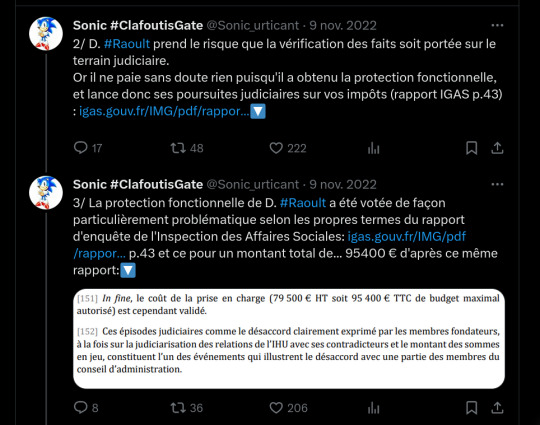
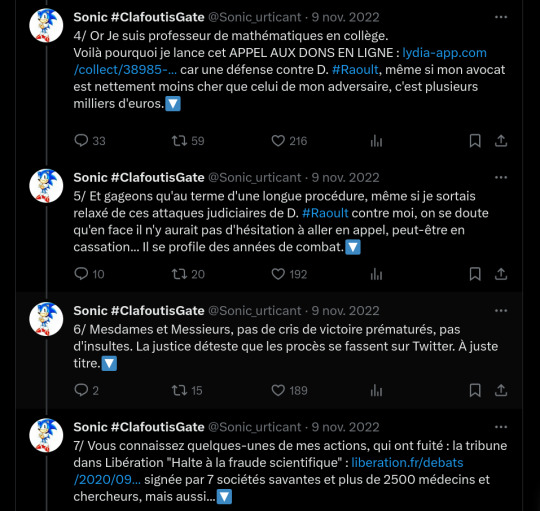
Souvenez-vous de l'arrivée de la pandémie de Covid. Fin de l'hiver 2020, début du printemps.
Des politiciens font des ronds de jambe à Didier Raoult. Des médias s'extasient devant ce "chercheur disruptif". Les autorités de santé et les responsables du monde académique font semblant de ne pas être concernés, alors que tous les signaux d'alarme sont au rouge. Bien des people, d'Afida Turner à André Dussolier, de Bernard Henri-Lévy à Jean-Marie Bigard, s'épanchent sur les plateaux TV et les réseaux sociaux pour raconter leur admiration devant celui qui est présenté comme un sauveur.
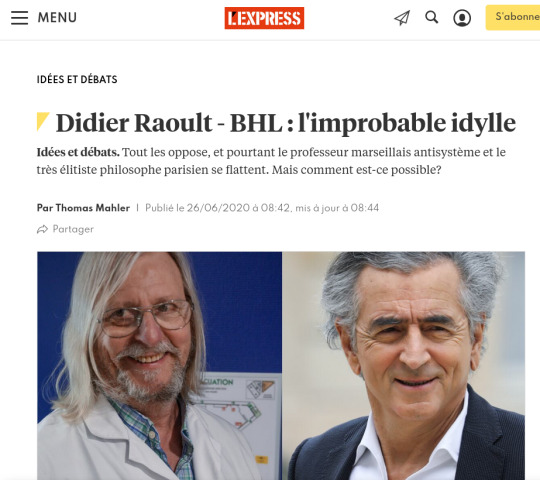




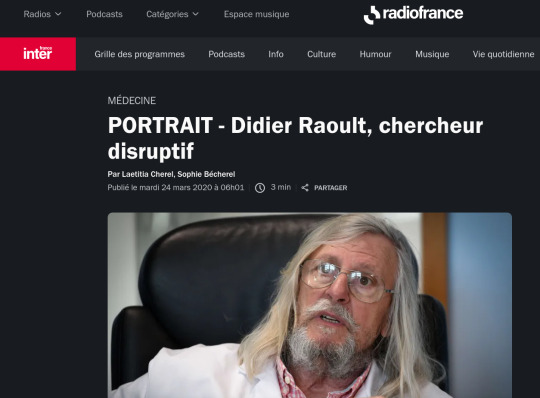
Et Didier Raoult multiplie les discours sensationnalistes sur le Covid, annonçant la découverte de soit-disant remèdes miraculeux à base de chloroquine, ou d'hydroxychloroquine, ça dépend des jours.
Et quelques personnes tentent d'alerter, repérant les incohérences et les faussetés du Grand Prophète de Marseille. Sonic Clafoutis a été de ceux-là. Précisément, factuellement, il communique du mieux qu'il peut. Si les gens comme lui avaient été écoutés, nous aurions sans doute évité des milliers et des milliers de morts. Le scandale de la chloroquine a représenté des pertes de chance, des investissements et du temps perdu, pour rien, alors qu'on savait depuis le départ que tout était du pipeau.


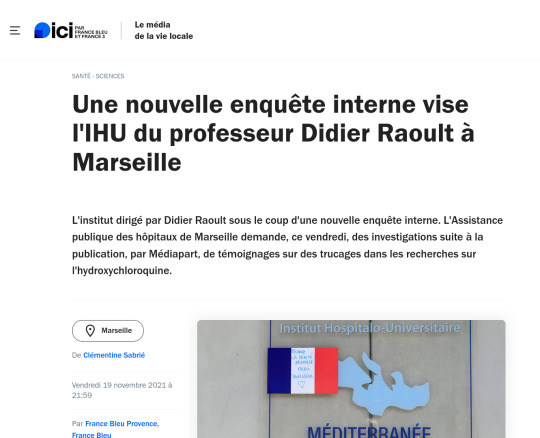
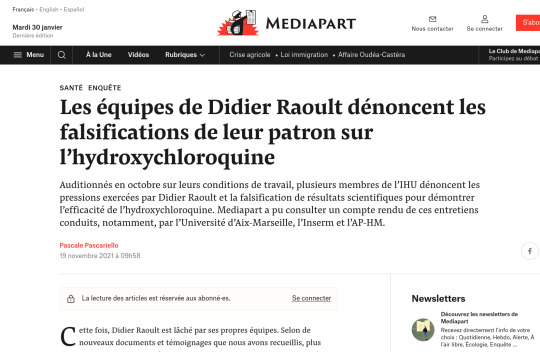

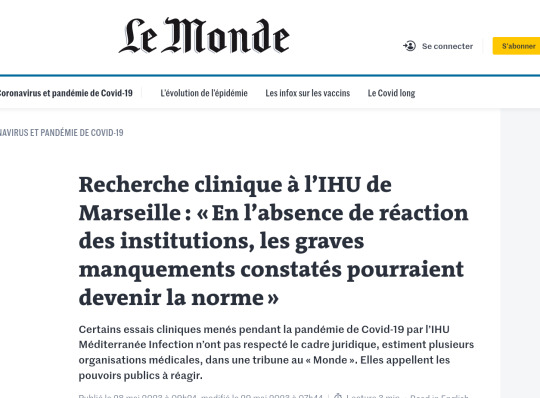
L'argent de l'IHU de Marseille sert aujourd'hui à punir celles et ceux qui ont tenté de tirer la sonnette d'alarme.
Ce n'est d'ailleurs pas nouveau. Elisabeth Bik, une spécialiste de la lutte contre la fraude scientifique, a elle aussi été visée par les mêmes méthodes. Et elle n'est pas la seule.
L'IHU de Marseille, sensé être un fer de lance de la lutte contre les maladies infectieuses, est utilisé comme arme pour faire taire et pour punir celles et ceux qui dénoncent la fraude scientifique.
C'est un scandale qui s'ajoute au scandale.
Et vous pouvez faire quelque chose. Vous pouvez donnez un coup de main à Sonic pour se défendre dans ce procès bâillon.
Si vous en avez les moyens, mettez un petit quelque chose dans cette cagnotte.
Pour suivre l'affaire depuis le début :
0 notes